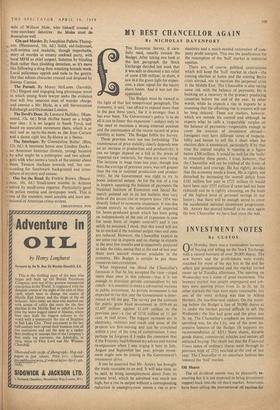MY BEST CHANCELLOR AGAIN
By NICHOLAS DAVENPORT
THE Economic Survey, if care- fully read, usually reveals the
Budget. After taking one look at the last paragraph the Stock Exchange decided last week that it was safe to discount a tax relief of some £300 million; in short, it saw in it the green light for expan- sion, a clear signal for the equity share boom. And it was not dis- appointed.
The Budget must be viewed in the light of that last unequivocal paragraph. The economy, it said, 'can afford to expand more than in the past three years,' for it is stronger than it has ever been. The Government's policy 'is to do all it can to foster this expansion'—subject only to 'the need to maintain a strong external position and the continuance of the recent record of price stability at home.' The Budget fulfils the Survey.
These provisos were not too forbidding. The maintenance of price stability clearly depends now on an increase in production and productivity; it can no longer depend on a fall in the prices of imported raw materials, for these are now rising. The increase in wage rates last year, though less than the average of previous years, was still greater than the rise in national production and produc- tivity. So the Government was right to try to boost industrial output. As for the risk of a rise in imports upsetting the balance of payments the National Institute of Economic and Social Re- search pointed out in its last bulletin that very little• of the excess rise in imports since 1954 was directly linked to economic expansion. It was due almost entirely to the substitution of imported for home-produced goods which has been going on independently of the rate of expansion (a case for some form of import control?) and it can safely be assumed, I think, that this trend will not be so marked if the national output rises and costs are reduced. However, the Chancellor expects to see some rise in imports and no change in exports in the next few months and is apparently prepared to take the risks, seeing that at the end of last year there were unused resources available in the economy. His Budget is certain to put those resources into circulation.
What impressed me about the Chancellor's forecasts is that he has accepted the view—urged more than once in this column—that it is not enough to stimulate private consumption by tax reliefs : it is essential to make a substantial increase in public investment. As -private investment is not expected to rise this year the Government is deter- mined to fill the gap. The survey put the estimate for public gross fixed investment in 1959-60 as £1,607 million against £1,449 million in the previous year—a rise of £158 million or I I per cent. in real terms. The biggest increases are in electricity, railways and roads and some of the projects are fast-moving and can be completed within a year of the time of authorisation. I may perhaps be forgiven if I make the comment that if the Treasury had followed my advice and started re-expansion when I was urging it here in July, August and September last year, private invest- ment might now be joining in the Government's investment drive.
It can be assumed that Mr. Amory has brought the trade recession to an end. It will take time, as he said, to bring unemployment down from its present level, which he admitted was much too high, but a rise in output without a corresponding reduction in unemployment means a rise in pro-
ductivity and a much-needed restoration of com- pany profit margins. This was the justification for the resumption of the 'bull' market in industrial equities.
There are, of course, political uncertainties which will keep the 'bull' market in check—the coming election at home and the coming Berlin . crisis abroad, not to mention the perpetual crisis in the Middle East. The Chancellor is also taking some risk with the balance of payments. He is banking on a recovery in the primary producing countries before the end of the year. In other words, while he expects a rise in imports he is assuming that the'offsetting rise in exports will not be long delayed. These are matters, however, which are outside his control and although he expects what he calls a 'respectable' surplus on the balance of payments—respectable enough to cover the amount of investment abroad— foreigners may have differeht views of respecta- bility and hasten to sell the £ short when the election date is announced, particularly if by that time the annual surplus is running at a figure below £300 million. It would be well for the 'bulls' to remember these points. I trust, however, that the Chancellor will not be robbed of the fruits of his wisdom and courage. He has rightly decided that the economy needs a boost. He is rightly not disturbed by increasing the overall deficit from £182 million last year to £721 million (it would have been only £355 million if taxes had not been reduced) and he is rightly assuming, on the basis of the highest level of personal savings in our history, that there will be enough saved to cover the accelerated national investment programme. Mr. Amory has proved himself to be once again the best Chancellor we have had since the war.














































 Previous page
Previous page